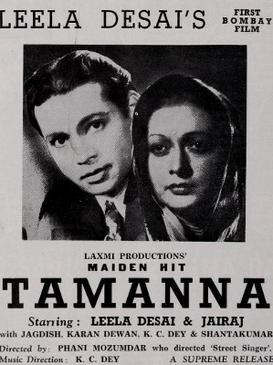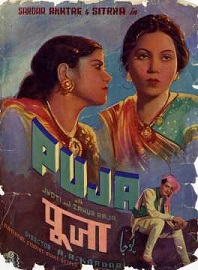
Anjaan is a 1940 Indian Hindi-language film directed by Amiya Chakrabarty and produced by Bombay Talkies. It was Chakrabarty's first film direction. The film's story and screenplay were by Amiya Chakrabarty, with dialogues by J. S. Casshyap. The cinematography was by the debutant R. D. Mathur. Its music direction was by Pannalal Ghosh, with lyrics by Kavi Pradeep and P. L. Santoshi. The film starred Devika Rani, who had recently returned to films after a two-year absence, following the death of her husband Himanshu Rai in 1940. The cast included Ashok Kumar, David, V. H. Desai, Gulab, Suresh and Om Prakash.

Tamanna is a Bollywood film. It was released in 1942. The film was directed by Phani Majumdar, who also wrote the screenplay, for the Laxmi Productions Ltd. banner. This was the first film from the Laxmi banner, which had been started by Chimanlal Trivedi who earlier headed Circo Productions. Tamanna was also the renowned dancer, Leela Desai's, first film in Bombay. The main cast included Leela Desai, P. Jairaj, Karan Dewan, Jagdish Sethi and K. C. Dey, who besides acting, composed the music. S. K. Kalla wrote the dialogue and lyrics.

Phir Bhi Apna Hai is a 1946 Indian Hindi-language film. It was released in 1946. The film was directed by Raja Nene for Venus Pictures under the Charolia Productions banner and was produced by A. V. Charolia. Music was composed by Ramchandra Pal with lyrics by Mukhram Sharma Ashant. The cast included Nalini Jaywant, Karan Dewan, Jagdish Sethi, Saroj Borkar, Kusum Deshpande and Vasant Thengdi.

Watan (transl. Homeland) is a 1938 Indian costume drama film directed by Mehboob Khan. Produced by Sagar Films, the film had story by Mehboob Khan and Wajahat Mirza. The cast of the film included Kumar, Bibbo, Maya Banerjee, Yakub Lala, Sitara Devi and Kayam Ali. The story set in Central Asia, based on the De-Cossackization policy, involving the Bolsheviks and Cossacks with the Cossacks fight for independence which was a symbolic reference to the independence from British rule in India at that time. It also incorporated a romantic triangle involving Kumar, Bibbo and Sitara Devi.
Kokila (transl. Nightingale) is a 1937 Hindi social family drama film directed by Sarvottam Badami. The music was composed by Anil Biswas with lyrics written by Siddiqui and Zia Sarhadi. The story was adapted from the well-known novel Kokila, written by Gujarati writer Ramanlal Vasantlal Desai. The film starred Motilal, Sabita Devi, Shobhna Samarth, Maya Bannerjee, Sitara Devi, Pesi Patel, Siddiqui and Kayam Ali.
Chingari (transl. Embers) is a 1940 social Hindi film directed by Sarvottam Badami. Made under the banner of Sudama Productions, the film had music by Gyan Dutt. Prithviraj Kapoor shifted from New Theatres Ltd. Calcutta to Bombay, where he worked under Badami in two films, Sajani and Chingari both made in 1940. The cast included Prithviraj Kapoor, Sabita Devi, E. Billimoria, Meera, Khatoon and Keshavrao Date.

Sawan Aya Re is a 1949 Hindi romantic drama film, directed by Kishore Sahu. Produced by Sahu under his "Hindustan Chitra" banner, it had Khemchand Prakash as the music director. The cast included Kishore Sahu, Ramola Devi, David, Pratima Devi, Ramesh Gupta, Sofia and Mohana.

Veer Kunal also called Son Of Ashoka is a 1945 Hindi historical fiction film directed by Kishore Sahu. Besides directing the film Sahu also produced it and wrote the story and screenplay. The cinematographer was Chandu. Produced under the Ramnik Productions banner, it had music by Khan Mastana. The starcast consisted of Kishore Sahu, Shobhna Samarth, Durga Khote, Mubarak and Maya Banerji.

Holi is a 1940 Hindi/Urdu social drama film directed by A. R. Kardar. Holi was produced by Ranjit Movietone and had music composed by Khemchand Prakash with lyrics by D. N. Madhok. It had Khursheed and Motilal starring in the lead with Sitara Devi, Ishwarlal, Keshavrao Date, Dixit, Ghory and Manohar Kapoor.

Baghban (transl. Gardener) is a 1938 Indian family drama film directed by A. R. Kardar.

Pooja (Worship) is a 1940 Indian Hindi/Urdu-language psychological drama film directed by A. R. Kardar. The music director was Anil Biswas, with lyrics by Khan Shatir Ghaznavi. Produced by National Studios, the story, screenplay and dialogue writer was M. Sadiq and the cinematographer was P. G. Kukde. The film starred Sardar Akhtar, Zahur Raja, Sitara Devi, Jyoti, Sankatha Prasad, Sunalini Devi, Bhudo Advani and Baby Meena.

Milap (transl. the union is a 1937 Indian social drama film directed by A. R. Kardar. Produced under the Moti Mahal Pictures banner, it had music composed by K. C. Dey. Milap was a big success for the actress Rampyari.

Jeevan Prabhat is a 1937 Hindi film social drama, produced by Bombay Talkies and directed by Franz Osten. The music director was Saraswati Devi with lyrics and dialogues by J. S. Casshyap. The screenplay was by Niranjan Pal. The film's "star value" was Devika Rani, with Kishore Sahu making his debut as an actor in the film. The cast included another debutant, Renuka Devi, with Mumtaz Ali, Maya Devi and M. Nazir.
![<i>Vachan</i> (1938 film) 1938 [[British India]] film](https://upload.wikimedia.org/wikipedia/commons/thumb/6/62/Vachan_1938_films.jpg/320px-Vachan_1938_films.jpg)
Vachan is a 1938 costume drama Hindi film directed by Franz Osten. The regular Bombay Talkies writer, Niranjan Pal, walked out of the Bombay Talkies production team after an altercation with Himanshu Rai in 1936. Saradindu Bandyopadhyay, a famous writer known also for creating Byomkesh Bakshi, replaced Pal in the story department, writing for films like Nirmala and Vachan in 1938 and Durga in 1939. The screenplay was by Agha Jani Kashmiri, with dialogues and lyrics by J. S. Kashyap. The music was composed by Saraswati Devi aided by J. S. Kashyap. The film starred Devika Rani and Ashok Kumar, a popular pair from Bombay Talkies who worked in seven films together. Devika Rani remained the bigger star with Kumar's name being "over-shadowed" in the credit rolls, as well as the publicity of the film.

Nartaki (Dancer) is a 1940 film directed by Debaki Bose for New Theatres Ltd, Calcutta. A bilingual made in Hindi and in Bengali, it had story and screenplay written by Bose, with cinematography by Yusuf Mulji. Music was composed by Pankaj Mullick. The cast had actress Leela Desai playing the title role of Nartaki. Najam also called Najam-Ul-Hasain or Najmul Hussain had left Bombay Talkies following his affair and elopement with Devika Rani, had now joined New Theatres Ltd, where he was cast in films like Anath Ashram (1937), Dushman (1939), Kapal Kundala (1939), and Nartaki. The rest of the main cast included Jagdish Sethi, Wasti and Pankaj Mullick in the Hindi version.
Abhagin is a 1938 Hindi film directed by Prafulla Roy for New Theatres Ltd., Calcutta. A bilingual, it was made in Bengali language as Abhigyan. The film was based on a story by Upendranath Ganguly, with dialogue by A. H. Shore. R. C. Boral provided the music composition with lyrics for the Hindi version by Munshi Arzu, and by Ajoy Bhattacharya for the Bengali. The screenplay was by Phani Majumdar for whom it was his first independent film as a scriptwriter. Bimal Roy, who was to make a name for himself as a prominent Bengali and Hindi director, was the cinematographer for the film. The cast included Molina Devi, Prithviraj Kapoor, Vijay Kumar, Nemo and Bikram Kapoor.

Bibbo was a music composer, singer and actress who worked in both Indian and Pakistani films. She acted in Indian cinema from 1931 to 1947 before moving to Pakistan, following Partition of India in 1947. She started her acting career with Ajanta Cinetone Ltd. in 1933, working with directors like M. D. Bhavnani and A. P. Kapoor. She was one of the top leading ladies of the 1930s along with actresses like Devika Rani, Durga Khote, Sulochana, Mehtab, Shanta Apte, Sabita Devi, Leela Desai and Naseem Banu. She was referred to as "one of the most important female stars of the 1930s and 1940s". Her fame had her featured in the lyrics of a popular song from the film Gharib Ke Lal (1939) sung by Mirza Musharraf and Kamla Karnataki, with music by Sagheer Asif and lyrics by Rafi Kashmiri. "Tujhe Bibbo Kahoon Ke Sulochana", where Sulochana referred to another popular actress of the time. This was the first time a song featuring famous actors was used in the lyrics of a film song.

Sagar Movietone also Sagar Films, Sagar Film Company and Sagar Productions was an Indian film production company involved in the making of films for Indian cinema. It was launched by Ardeshir Irani with Chimanlal Desai and Dr. Ambalal Patel in 1929 in Bombay, Maharashtra, India. Sagar was initially started as a branch company of Ardeshir's Imperial Film Company. Several key figures from Imperial, such as Mehboob Khan were shifted to Sagar. The studio was in operation from 1930 to 1939. In 1940, it combined with General Pictures to form National Studios. It made "Parsi theatre based films, mythologicals and stunt movies". Sagar fostered the career of many artists who rose to prominence. Early directors such as Prafulla Ghosh, Sarvottam Badami, Ezra Mir and Nanubhai Vakil were promoted by the company. Mehboob Khan got his first break as a director in Al Hilal in 1935. He was referred to as "the most important alumnus" from Sagar, who went on to become one of Indian cinema's "most influential film-makers".

Mazhar Khan was an actor, producer, and director in Indian Cinema. He began his career as a police officer, which he left to study law for a short period. After abandoning his studies, he came to Bombay and started his career in cinema with the silent film Fatal Garland (1928) opposite the top actress of the time, Ermeline. He became a popular actor, gaining success in several silent films. During his stint in silent films he worked with directors such as Bhagwati Prasad Mishra, Ezra Mir, Moti P. Bhagnani, R. S. Chowdhary, and M. D. Bhavnani. Magazines in the 1940s compared Khan to Hollywood actors such as Paul Muni, Bela Lugosi and Boris Karloff.












![<i>Vachan</i> (1938 film) 1938 [[British India]] film](https://upload.wikimedia.org/wikipedia/commons/thumb/6/62/Vachan_1938_films.jpg/320px-Vachan_1938_films.jpg)



